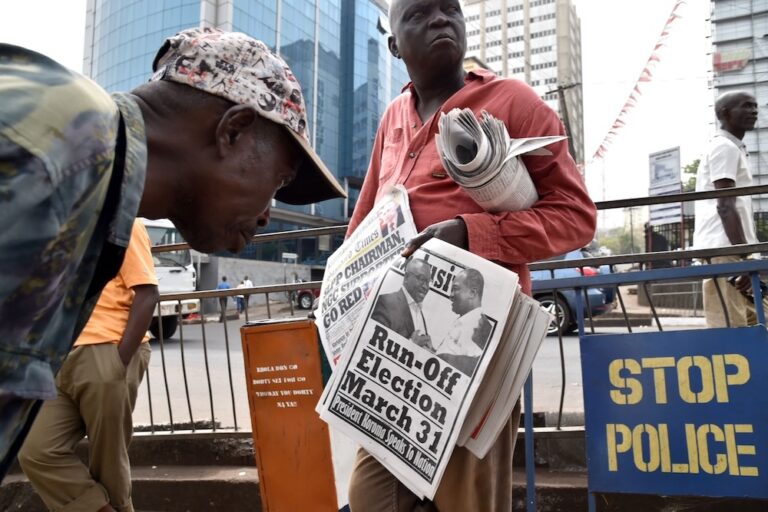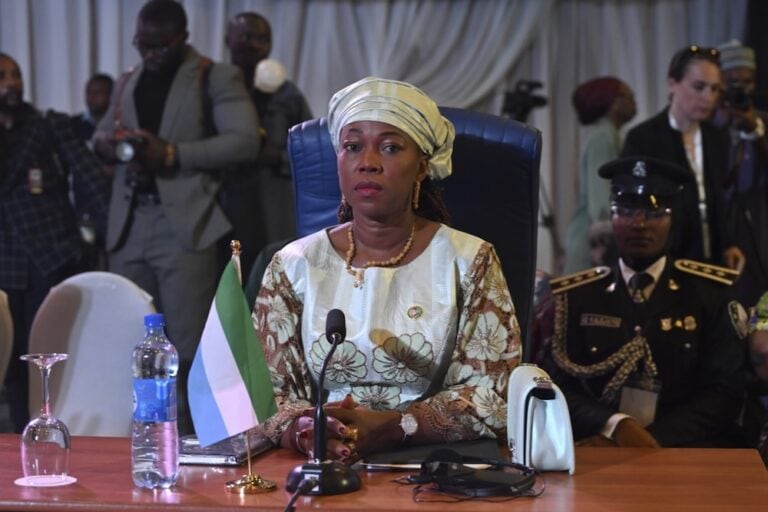(ARTICLE 19/IFEX) – The following is an ARTICLE 19 submission to the Government of Sierra Leone on the Independent Media Commission Bill: SUBMISSION BY ARTICLE 19 TO THE GOVERNMENT OF SIERRA LEONE ON THE INDEPENDENT MEDIA COMMISSION BILL, NO. 99 OF 1999 ARTICLE 19 notes with interest that the above Bill has recently been tabled […]
(ARTICLE 19/IFEX) – The following is an ARTICLE 19 submission to the
Government of Sierra Leone on the Independent Media Commission Bill:
SUBMISSION BY ARTICLE 19 TO THE GOVERNMENT OF SIERRA LEONE ON THE
INDEPENDENT MEDIA COMMISSION BILL, NO. 99 OF 1999
ARTICLE 19 notes with interest that the above Bill has recently been tabled
before Parliament by the Minister of Information, Communications, Tourism
and Culture, Hon. Dr Julius Spencer, and that it is due to be considered by
Parliament next week. What follows are brief comments by ARTICLE 19 on the
contents of the draft Bill. We hope that the government of Sierra Leone
will give serious consideration to the points which we raise here before the
Bill passes into law. We also hope that they will be useful to Sierra
Leonean parliamentarians and other interested parties in their consideration
of the draft Bill.
ARTICLE 19’s main concerns
ARTICLE 19 has stated in the past that an archaic legal and institutional
framework for the protection and promotion of freedom of expression has been
one of the main causes of Sierra Leone’s political and human rights crisis
over the past decade. In some important respects — for example, its
proposal to establish an independent regulatory authority for
broadcasting — the Bill is a welcome step forward. However, in other
regards the Bill raises as many questions as it answers and, if passed as it
currently stands, would represent a missed opportunity to strengthen freedom
of expression in Sierra Leone.
ARTICLE 19 has three main concerns about the Bill, as it stands:
1) The government of Sierra Leone has once again been unable to resist
succumbing to the temptation to impose statutory regulation on the print
media (Part III [B] of the draft Bill). ARTICLE 19 believes that statutory
regulation is appropriate to the broadcasting sector, where – particularly
in the case of public broadcasters – there are important public interest
considerations. In relation to the print media, however, public interest
obligations apply less strictly. Radio and television frequencies are
limited in availability. Accordingly, it is legitimate for there to be
statutory oversight to ensure that there is sufficient media pluralism and
diversity of views being expressed. There are no such technical limitations
upon the number of newspapers and magazines. ARTICLE 19’s monitoring of such
regulation in other parts of the world has demonstrated that statutory
regulation of the print media is often a vehicle for political interference.
ARTICLE 19 believes that, beyond strictly technical requirements regarding
registration (for example, periodic returns giving details of proprietors,
editors and address), the appropriate form of regulation for the print media
is self-regulation, however imperfect it may be in practice. The costs of
statutory regulation of the print media with regard to freedom of expression
invariably outweigh the perceived benefits.
Although the Bill makes considerable efforts to ensure that the proposed
Independent Media Commission (IMC) is genuinely independent of government
through its provisions regarding the process of appointing the board,
ARTICLE 19 is gravely worried that, by establishing the legitimacy of the
principle of statutory regulation of the print media – including with regard
to complaints by the public – the Bill creates a trojan horse which
governments will be unable to resist using in future to harass and
intimidate critics. In this regard, the provision in the Bill that
newspapers and magazines will not be registered unless they can demonstrate,
when applying for registration, that they have no income tax arrears, is an
ominous warning sign. ARTICLE 19 believes that this provision creates a
penalty upon newspapers and magazines which is additional to those which
companies more generally may face under the Income Tax Act. As such, this is
a discriminatory proposal which threatens freedom of expression.
ARTICLE 19 calls on the government to reconsider its intention to establish
a cumbersome and potentially restrictive regime for the statutory regulation
of the print media. At the very minimum, it should withdraw from the Bill
the provision linking the registration of newspapers and magazines to income
tax requirements.
2) The Bill takes the power to issue, suspend or revoke broadcasting
licences away from the Minister of Information and gives it to the IMC (Part
III[A] of the draft Bill). This is a welcome step towards an allocation
process which is independent, fair and non-discriminatory. However, it is a
half-step only. ARTICLE 19 believes that, in order to create a process for
allocating licences which has full credibility, a provision should be added
to the Bill stipulating that licence application hearings should be held in
public.
In addition, the criteria for granting, refusing or revoking broadcast
licences are worryingly broad or vague and potentially open to abuse.
Refusals can be based on national security or public safety grounds or
“other reasonable justification”. Licences will be granted if a service is
in the “interest of the public”. While this Bill is not necessarily the
place to attempt narrower definitions of such problematic terms, it
highlights the need for a wider review of laws in order to ensure that they
meet international human rights standards. This will inevitably take time.
In the immediate context of this Bill, ARTICLE 19 calls for amendments to
the Bill which state that the primary “public interest” with regard to
granting licences is a process which promotes pluralism in views,
programming and ownership and which stipulate that licences will only be
revoked in extreme circumstances in the event of gross and repeated abuse by
the broadcaster. An example of “extreme circumstances” might be direct
incitement to violence.
3) The wider review of laws required in Sierra Leone to meet international
human rights standards points to another major concern of ARTICLE 19’s
regarding this Bill. When ARTICLE 19 met with the Minister of Information in
July 1998, he stated that he was undertaking a review of the legal framework
for the regulation of the media. At the time, he expected that review to be
completed by the end of 1998. The Minister gave indications that the offence
of seditious libel, as provided for in the 1965 Public Order Act, was likely
to be removed from the statute book. He also stated that the Sierra Leone
Broadcasting Service was to be made statutorily independent. We welcomed
these undertakings. ARTICLE 19 also urged the government, inter alia, to
repeal provisions in the same Act regarding “false reports” and the laws on
criminal defamation and the banning of newspapers. (Strengthening the right
to freedom of expression in Sierra Leone: ARTICLE 19’s recommendations for
action by the government of Sierra Leone and the international community, 3
September 1998).
Events over the past year make it understandable that the review process
should have ground to a halt. However, we hope that the review process is
now being resurrected following the signing of the peace agreement on 7 July
1999 and that this Bill is quickly followed by measures which remove such
outdated restrictions upon freedom of expression from the statute book.
ARTICLE 19 calls upon the government to take urgent steps to create a
general legal climate conducive to freedom of expression by repealing
existing laws on seditious libel, “false news”, criminal defamation and the
banning of newspapers.
Other concerns
ARTICLE 19 has a range of other concerns regarding the draft Bill. These are
itemized below:
– Section 3 (b), which sets out one of the objects of the IMC, refers to
ensuring “compliance with legislation and Government policy on media
activities in the interest of the people of Sierra Leone.” We believe that
the reference to “legislation” is unclear. Do the drafters mean general
legislation? It would surely not be reasonable to expect the IMC to play
such a role. “Compliance” should only apply to relevant media-related
legislation. Further, our view is that “ensuring compliance” is too
proscriptive with regard to government policy. A more appropriate form of
words might be “to facilitate and support the development of Government
policy on media activities”.
– Section 15(1) states, that any person who has been refused a licence by
the IMC, or has had it suspended or cancelled, should appeal first to the
Minister of Information. This raises the danger of politically-motivated
considerations coming into play in the context of the licence allocation
process. ARTICLE 19 believes that an appeal against a decision of the IMC
should go directly to the High Court, without any intervening stage.
– Section 16, which gives the IMC general powers to determine what standards
of performance a broadcaster should achieve, appears very vague. Given that
the IMC is elsewhere given powers to attach conditions to the granting of a
licence, it is difficult to avoid the conclusion that this is an unnecessary
clause which could be removed.
– Sections 17-21, which provide for the registration of newspapers and
magazines, create registration requirements which, in our view, go beyond
the strictly technical arrangements which can be legitimately imposed upon
such newspapers and magazines. We believe that these sections should be
removed.
– Sections 23-25, while addressing the type of registration requirements
which can be designated as technical arrangements, nonetheless set up an
unnecessarily detailed process for providing annual returns by newspapers
and magazines, reinforcing suspicions that what the government is primarily
interested in is control over the fate of the print media, using the IMC as
the vehicle for that control. ARTICLE 19 believes that it would be more
appropriate to give the IMC the power to decide for itself what a suitable
process for submitting annual returns should be.
– Section 29(2), which requires that a director or the secretary of a
company which publishes a newspaper or magazine should sign the copies sent
to the Minister of Information, seems once again to be creating an
unnecessarily bureaucratic and time-consuming process. In our view, this
section should be removed.
– Section 33 (2), regarding the public complaints committee, provides for
the appointment of members of the general public to the committee. We would
suggest that, if this provision is retained, some stipulation is at least
made that such individuals should have relevant experience with regard to
the media.
– We suggest that Section 34(1)(a) should include a stipulation that the IMC
should be guaranteed adequate parliamentary funds.
– Section 34(1)(c) appear to us to place the IMC in a potential conflict of
interest, whereby it imposes high fines in order to increase its funds.
Perhaps this is an issue which needs review.
– Section 37 states that the Board of the IMC should submit an annual report
to the Minister of Information, who in turn should submit a report to
Parliament. We propose that, in order to maximize transparency and enhance
the credibility of the IMC, the full text of the Board’s report to the
Minister should also be submitted by him/her to Parliament.
– Section 40 states that the Minister of Information may make regulations in
pursuance of the provisions of the Act. We suggest that, in order to
safeguard the independence and credibility of the IMC, a stipulation should
be added to the effect that the Minister will act on the basis of
recommendations from the Commission. Further, we propose that any
regulations, given the importance of media freedom to the health of
democracy, should have to be placed by the Minister before a parliamentary
committee for debate and assent before becoming law.
There are other important concerns which do not appear to have been fully
addressed by the Bill, as it stands:
– ARTICLE 19 believes that the Bill should make it clear that members of the
IMC’s Board should not maintain any interest, financial or political, that
could impair their ability to discharge their duties in a fair and impartial
manner. One way of addressing this concern would be for parliament to hold
public “confirmation” hearings at which such issues could be openly raised.
Such a stipulation would give the provision in Section 5 (3), that
appointments will be subject to parliamentary approval, genuine substance.
At the same time, the IMC should have the power to devise explicit conflict
of interest rules which can be applied to the appointments process.
– ARTICLE 19 believes that the Bill should state that, in addition to
promoting “fair competition” (Section 3 (e)), the IMC should have
responsibility for establishing clear limits on media ownership, including
cross-media ownership between the broadcast and print sectors, in the
interests of diversity and pluralism.
– ARTICLE 19 believes that an additional object of the IMC should be to
promote a favourable economic climate for broadcasting. This can be done,
for example, by developing guidelines for non-preferential allocation of
government advertising and bringing to the attention of government any
discriminatory taxes and import duties which favour state media and penalize
the private sector.
– ARTICLE 19 believes that the IMC should be given the responsibility for
ensuring that all political parties have equitable access to, and fair
coverage in, the broadcast media during elections.
Our last observation relates to the Media Code of Practice which is provided
for by the draft Bill. One of the first tasks of the IMC will be to adopt
this Code. It follows from our comments above that we believe that it should
apply solely to the broadcast media. We hope that the IMC, once established,
will ensure that there is the fullest possible consultation with media
organisations and workers in Sierra Leone before the Code is finalised. In
addition, we hope that the IMC will take as its starting point the
importance of ensuring that the Code promotes and protects freedom of
expression.


